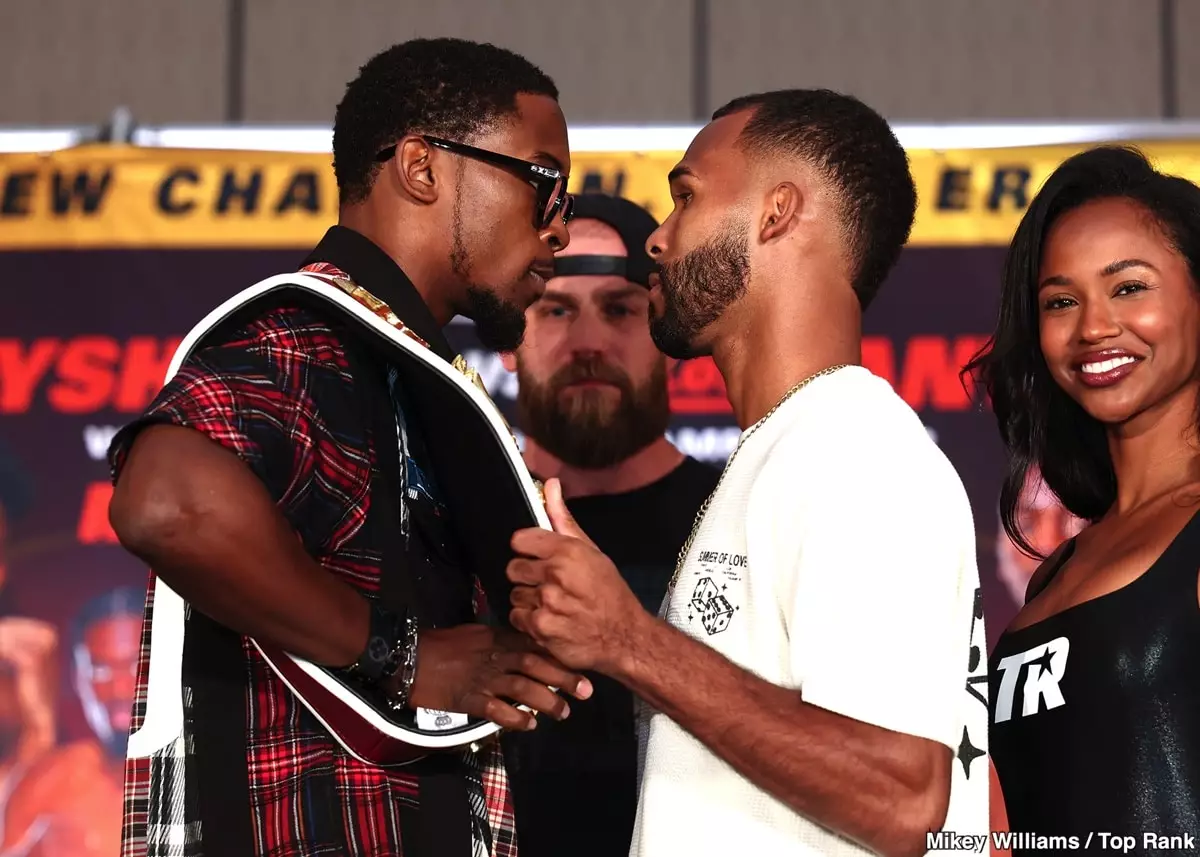In the realm of professional boxing, a fighter’s commitment is often measured not just by their punches in the ring but also by their actions outside of it. This idea was brought sharply into focus with Keyshawn Davis’s shocking weigh-in that left many questioning his resolve. Trainer Greg Hackett expressed concerns that Davis intentionally weighed in at an astonishing 4.3 pounds over the lightweight limit for his scheduled bout against Edwin De Los Santos. This unprecedented move has ignited a firestorm of debate, suggesting more than just a casual oversight; it hints at fear and the lengths to which an athlete might go to dodge a looming threat in the ring.
Davis’s decision to forego serious weight management has raised eyebrows, particularly in light of Hackett’s assertions that the fighter was possibly intimidated by De Los Santos’s power and reputation. The implications are stark: if true, this reflects a troubling mentality that contradicts the fearless image we often associate with elite fighters. Boxing history is rife with tales of fighters ducking their competition, but rarely is this ducking so blatantly exposed through tangible actions such as a significant weigh-in discrepancy.
Fear or Strategy? The Motivations Behind the Weigh-In
The dialogue surrounding Davis’s weigh-in suggests a layered narrative of self-preservation and possibly miscalculation. Hackett hints that Davis weighed in heavy as a strategy to avoid facing an opponent he may have deemed threatening. He argued that such a lackadaisical approach to weight suggests a certain disrespect toward the sport, the fans, and, most importantly, an apparent lack of faith in his ability to win.
This revelation prompts a broader discussion about how fear can manifest in sport. Athletes are often seen as fearless warriors, yet the reality can be markedly different. The choice to overindulge rather than submit to the demanding discipline of training and weight management can be seen not just as poor preparation but a symptom of deeper insecurities. If Hackett’s assessment is accurate, then Davis’s actions highlight the mental hurdle many fighters face when pushed to contend with their fears rather than confront them head-on.
Implications for Keyshawn Davis’s Future
Davis’s reputation hangs precariously in the balance following these accusations. Hackett’s criticism, particularly the jab at how Davis responded to former rival Andy Cruz, underscores not just a personal failure but an identity crisis within Davis himself. The world of boxing is unforgiving, and such an incident may have long-lasting repercussions for a fighter built on the promise of becoming a future champion.
If Hackett’s theory is accurate and Davis sought to avoid a potential loss, it brings to light essential questions about accountability in professional boxing. Can a fighter regain respect after attempting to evade a confrontation? In an industry where reputation can make or break careers, this incident could anchor Davis’s trajectory, shaping public perception and future matchups.
Moreover, it raises the question of how Davis will move forward. Will he confront his perceived weaknesses and take on opponents with strength, or will this incident become a catalyst for further avoidance? At a pivotal stage in his career, Davis’s next steps will be closely scrutinized by fans and critics alike.
The Ripple Effect of Controversy
The ramifications of this incident extend beyond Davis alone; they ripple through the sport as a whole. For emerging fighters, this situation serves as a cautionary tale about the pitfalls of fear and mismanagement. Hackett’s pointed remarks also highlight an inherent pressure for all athletes to maintain integrity in their fight and in their character. In an era where accountability and authenticity are prized, fighters are under constant scrutiny, and those who don’t rise to the occasion may see their dreams evaporate amid accusations of cowardice.
Moreover, boxing promoters and matchmakers must confront the realities of these situations. They play a pivotal role in shaping the narratives that surround fighters like Davis. An athlete’s fear-based decisions can jeopardize not just their career but the entire promotional landscape, where fan loyalty is predicated on the belief that fighters will face adversity rather than evade it.
The controversy surrounding Keyshawn Davis’s weigh-in has exposed deep-rooted issues in the psyche of professional fighters, reflecting a struggle that resonates beyond the boxing ring. Davis may need to reflect deeply on his motives and approach, as the boxing world watches closely, waiting to see how he will redefine his path moving forward.


Leave a Reply